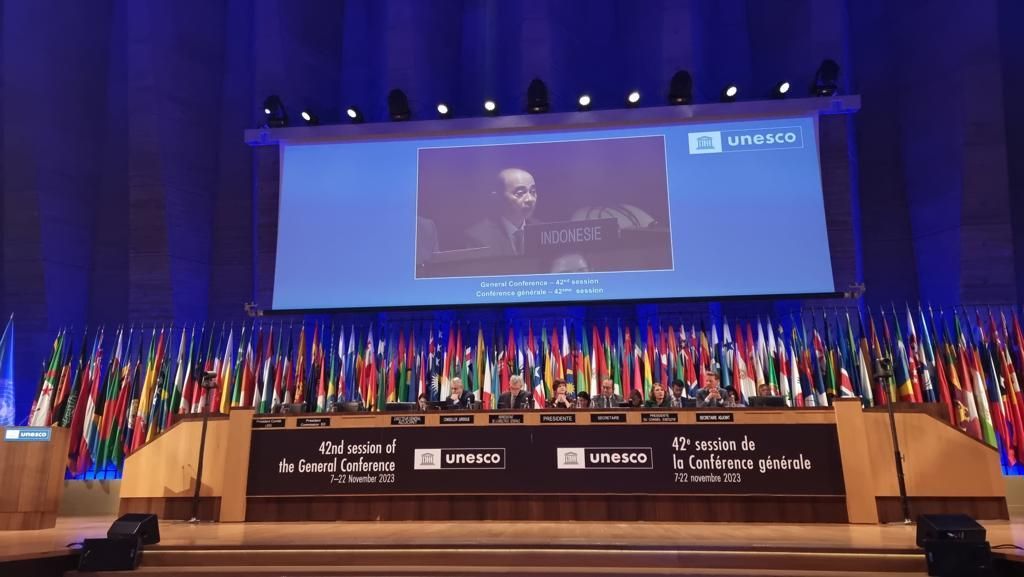The 42nd Session of the General Conference of UNESCO, held in UNESCO Headquarters in Paris on November 7-22, has generated positive results for Indonesia. During the election of Members of the Executive Board of UNESCO on November 15, Indonesia was voted by 154 out of 181 countries and elected as the board’s member for the 2023-2027 period.

Indonesia competed with eight other countries in the Asia-Pacific region for six allocated seats in electoral group IV for the UNESCO Executive Board. The eight countries are Afghanistan, Australia, Bangladesh, Iran, Kyrgyzstan, Pakistan, South Korea and Sri Lanka, and the six elected included Pakistan, Bangladesh, Sri Lanka, South Korea, and Australia.
In his remarks, the Indonesian Ambassador to France, Andorra and Monaco, and Permanent Delegate to UNESCO, Mohamad Oemar, expressed his gratitude for the unwavering support from UNESCO member countries. “Indonesia is committed to being actively involved and collaborating with other member countries to ensure progress and sustainability in various fields that UNESCO focuses on,” he said.
Oemar underlined that UNESCO’s mission, dedicated to promoting global peace and the prosperity of humans, is recognized as a valuable milestone by Indonesia, which highly values the principles of pluralism, multilateralism, and international cooperation, which are the keys to success in responding to world challenges, including achieving sustainable development goals in all areas of competence mandated by UNSECO.
During the Intergovernmental Council of the International Programme for the Development of Communication (IPDC) election on Thursday, November 16, Indonesia was also elected as a council member for 2023-2027, with Oemar noting that Indonesia’s election as a member is momentum for the country to take a strategic role in navigating the transformation of media and policies through UNESCO.
“Indonesia is committed to continuing to actively participate, holding dialogue, and collaborate with other member countries in responding to issues of media and technology development and the making of communication and media policies in UNESCO forums,” the ambassador remarked.
As the council’s member, Indonesia will take part in determining policy suggestions, monitoring and vision for freedom of expression, access to information, and digital transformation to ensure fundamental freedom is guaranteed, both online and offline, in line with international standards.
Lastly, the Indonesian language has also been designated as an official language of the UNESCO General Conference, based on adopting Resolution 42 C/28 during the Plenary Meeting of the 42nd Session of the UNESCO General Conference on Monday, November 20. Indonesian became the 10th official language, in addition to English, Arabic, Mandarin Chinese, French, Spanish, Russian, Hindi, Italian, and Portuguese.
Oemar stated that the Indonesian language has more than 275 million speakers while delivering Indonesia’s proposal presentation, adding that the curriculum has entered 52 countries, with at least 150,000 foreign speakers currently. He emphasized that improving awareness of its language was part of Indonesia’s global effort to develop connectivity between nations and bolster cooperation with UNESCO. In addition, it is also part of Indonesia’s commitment to cultural development at the global level.
Reported by Lintang Budiyanti, Raka Adji
Edited by Anton Santoso, Copyright (c) ANTARA 2023
